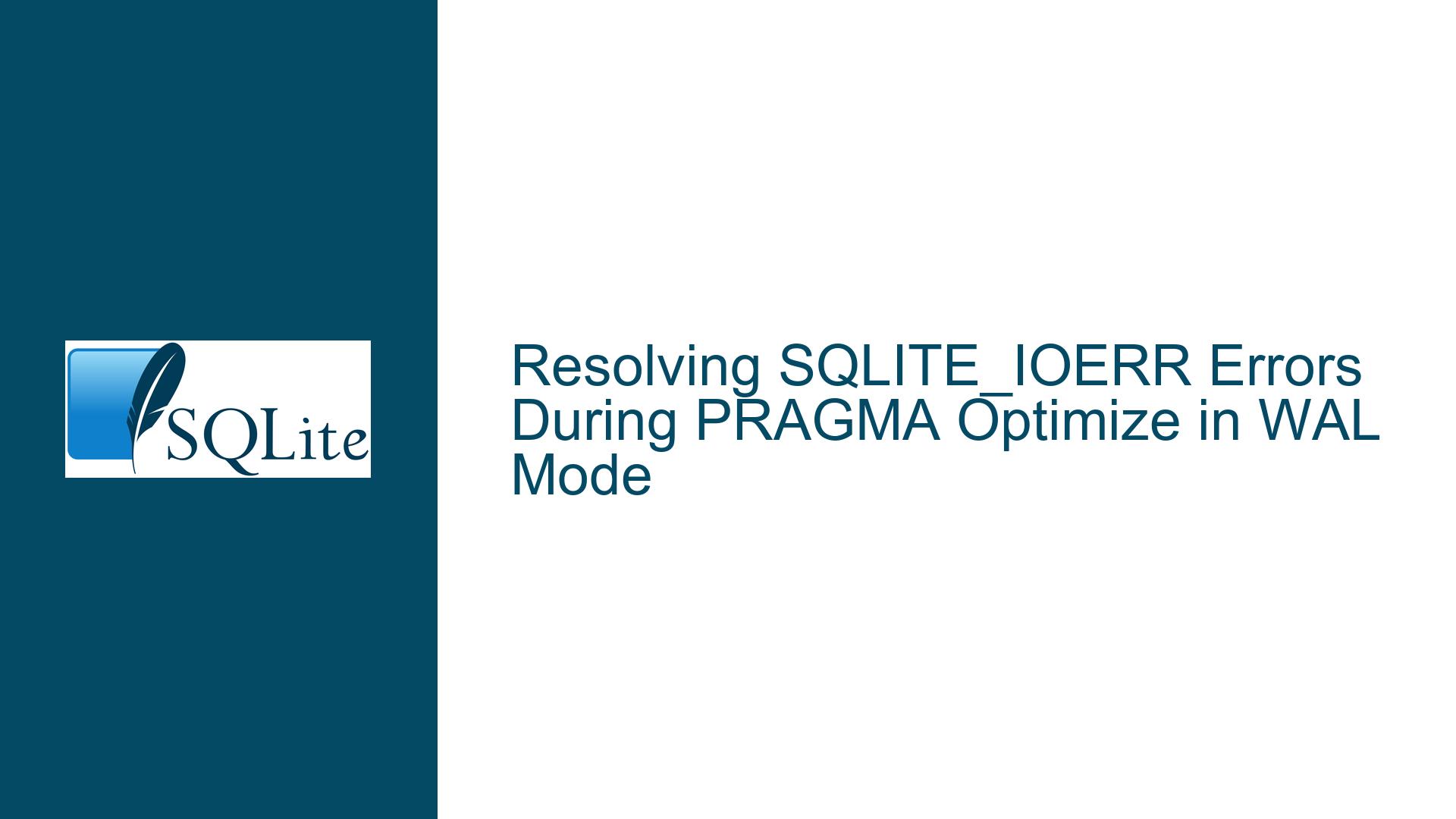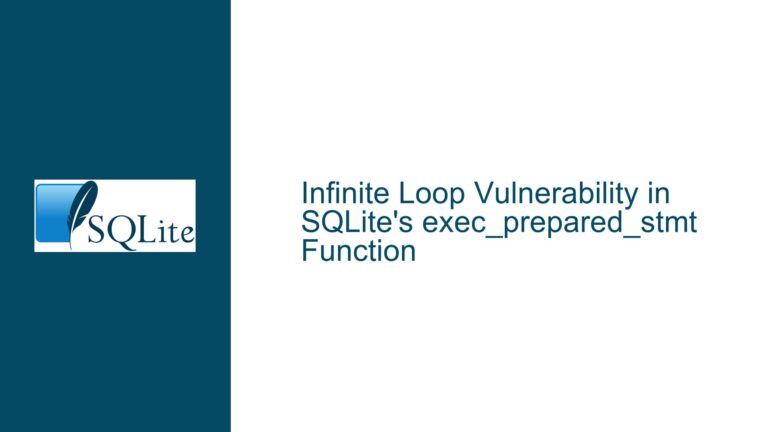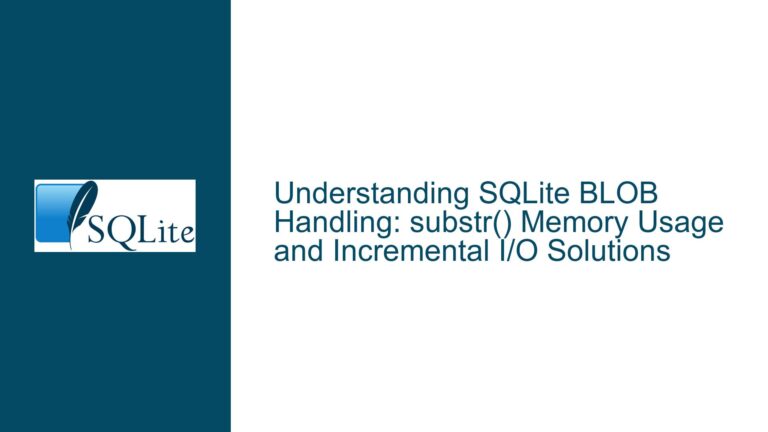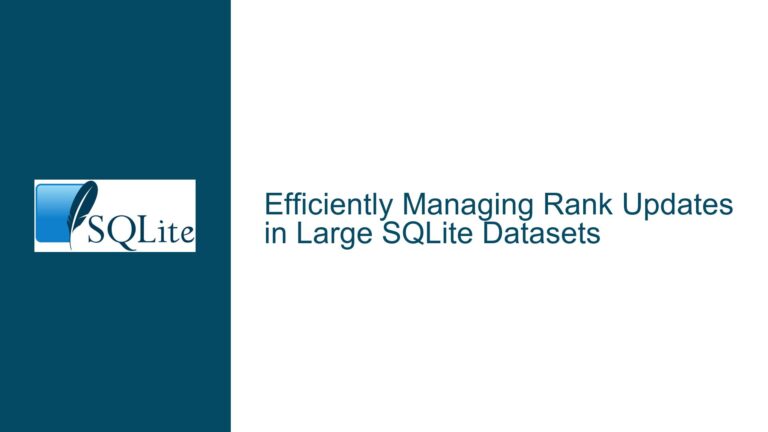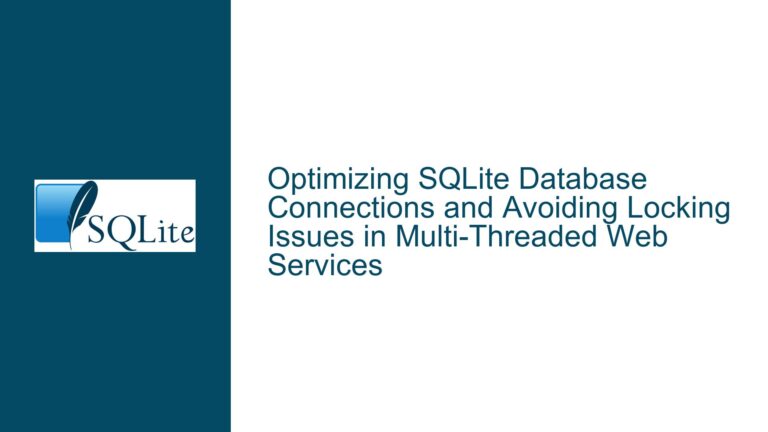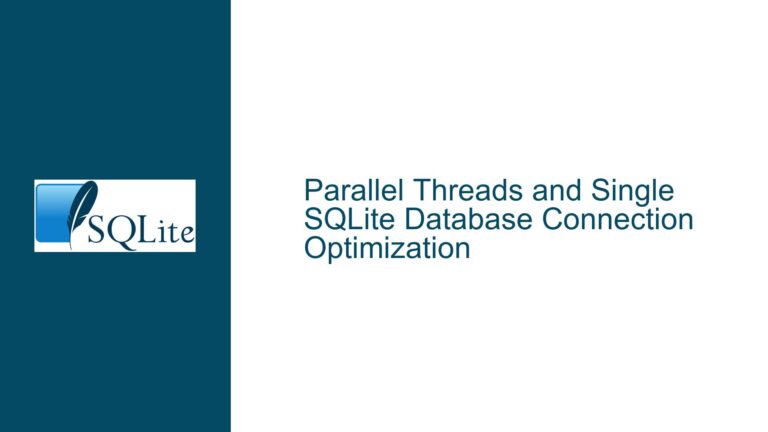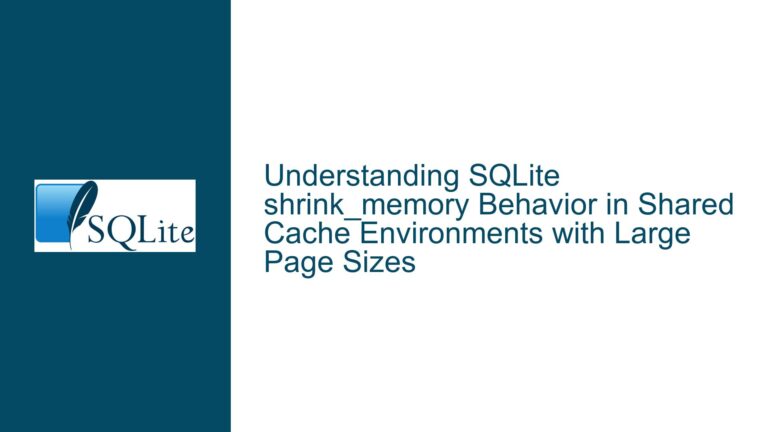Resolving SQLITE_IOERR Errors During PRAGMA Optimize in WAL Mode
Understanding SQLITE_IOERR and PRAGMA Optimize Interactions
The SQLITE_IOERR error code represents fundamental input/output operation failures during database transactions. When occurring specifically during execution of PRAGMA optimize – a command designed to improve query planner efficiency through statistical analysis – the collision between optimization routines and Write-Ahead Logging (WAL) journal mode reveals complex behavioral patterns in SQLite’s storage engine. This error manifests as Error Code 10 (SQLITE_IOERR) or its extended variants, often accompanied by opaque diagnostic messages that obscure the underlying filesystem/database architecture conflict.
PRAGMA optimize operates by automatically running ANALYZE commands on tables and indexes that would benefit from updated statistics, guided by internal heuristics about query patterns. Its execution requires both read and write access to database pages for sampling distributions, which intersects critically with WAL mode’s concurrency mechanisms. The WAL journal mode fundamentally alters SQLite’s transaction durability model by buffering changes in a separate write-ahead log file before eventual checkpointing to the main database. This architectural difference introduces unique locking scenarios and file handle requirements that conventional rollback journal modes don’t exhibit.
The collision point emerges when PRAGMA optimize’s statistical sampling needs to access database pages that may be undergoing concurrent modification or checkpoint operations. WAL mode’s shared memory (SHM) file management and multi-version concurrency control (MVCC) create transient states where database pages exist in multiple locations (WAL file, database file, and memory mappings). Optimization routines traversing these distributed storage layers may encounter temporary file access conflicts that surface as I/O errors, particularly when filesystem permissions, storage media latency, or antivirus interference disrupt SQLite’s expected access patterns.
Root Causes of SQLITE_IOERR During Optimization in WAL Mode
Four primary failure vectors explain why PRAGMA optimize triggers SQLITE_IOERR in WAL-configured databases:
1. WAL File Locking Contention
The WAL index (wal-index) maintained in shared memory coordinates reader/writer access through memory-mapped I/O. PRAGMA optimize’s ANALYZE operations require consistent snapshots of table data, which conflicts with active transactions modifying tables during statistical sampling. If the wal-index cannot guarantee a stable view of the database pages needed for analysis due to rapid write activity, SQLite may abort the operation with SQLITE_IOERR_SHAREDCACHE or related extended error codes.
2. Filesystem Journaling Interference
On macOS (HFS+/APFS) and Windows (NTFS) systems, filesystem-level journaling can introduce unexpected latency during SQLite’s low-level I/O operations. PRAGMA optimize generates numerous small read/write operations across database pages and WAL files. When the OS filesystem journal batches these operations differently than SQLite expects, temporary access denials or timeout conditions manifest as disk I/O errors. This is particularly prevalent on network-attached storage with relaxed consistency guarantees.
3. SHM File Descriptor Exhaustion
WAL mode utilizes a shared memory file (.shm) for coordinating concurrent access. PRAGMA optimize’s intensive page sampling can rapidly cycle through file descriptors when analyzing large tables. If the process’ file descriptor limit is constrained (common in containerized environments), subsequent I/O operations during analysis will fail with SQLITE_IOERR_SHMOPEN errors. This often surfaces as a generic SQLITE_IOERR due to error code propagation through abstraction layers.
4. Checkpoint-Auto Interference
Automatic WAL checkpointing triggers during database connection close or when the WAL file exceeds SQLITE_DEFAULT_WAL_AUTOCHECKPOINT threshold (normally 1000 pages). PRAGMA optimize’s statistical sampling may collide with these background checkpoint processes, especially when analyzing tables that contribute significantly to WAL growth. The concurrent access to both WAL segments and main database files during checkpoint/analyze operations creates race conditions that abort with I/O errors.
Comprehensive Diagnostic and Remediation Strategies
Phase 1: Environmental Validation
Begin by isolating hardware/filesystem factors using SQLITE_FCNTL_PERSIST_WAL file control:
sqlite3_file_control(db, "main", SQLITE_FCNTL_PERSIST_WAL, &persist_wal);
Set persist_wal=1 to maintain WAL files across connections, testing if persistence reduces open/close churn during PRAGMA optimize. Monitor with:
PRAGMA wal_checkpoint(TRUNCATE);
PRAGMA analysis_limit=400;
PRAGMA optimize;
If errors persist, validate storage media integrity using:
dd if=/dev/zero of=dbtest bs=4k count=10000 conv=fdatasync
Measure write latency and compare against SQLite’s expected I/O thresholds (typically <50ms for rotational media, <10ms for SSD).
Phase 2: WAL Configuration Tuning
Adjust WAL auto-checkpointing to prevent background interference:
PRAGMA wal_autocheckpoint=2000; -- Double default page threshold
PRAGMA journal_size_limit=1000000; -- Limit WAL to 1MB
Enable persistent shared memory to reduce SHM file descriptor pressure:
sqlite3_config(SQLITE_CONFIG_URI, 1);
sqlite3_open_v2("file:test.db?cache=shared", &db, SQLITE_OPEN_READWRITE | SQLITE_OPEN_CREATE, NULL);
Implement manual checkpointing before optimization:
PRAGMA wal_checkpoint(PASSIVE); -- Flush WAL without reset
PRAGMA optimize;
Phase 3: PRAGMA Optimize Workarounds
Bypass automatic analysis through targeted ANALYZE commands:
SELECT tbl_name FROM sqlite_schema WHERE type='table';
-- Manually analyze tables showing query planner misses
ANALYZE causal_parent;
ANALYZE causal;
Adjust analysis limits to prevent full-table scans:
PRAGMA analysis_limit=100;
PRAGMA optimize;
For critical deployments, schedule optimization during maintenance windows:
sqlite3_update_hook(db, optimization_scheduler, NULL);
Implement hook-based monitoring to trigger PRAGMA optimize only after low-write activity periods.
Phase 4: Filesystem-Level Mitigations
Configure mount options to favor SQLite’s access patterns:
# Linux ext4 example
mount -o noatime,data=writeback,discard /dev/sdX /dbs
Set I/O scheduler to deadline/noop for SSD arrays:
echo deadline > /sys/block/sdX/queue/scheduler
Implement filesystem ACLs to prevent antivirus real-time scanning of WAL/SHM files:
Add-MpPreference -ExclusionPath "C:\dbs\*.shm"
Add-MpPreference -ExclusionPath "C:\dbs\*.wal"
Phase 5: Connection Pool Optimization
Fine-tune connection handling to maintain WAL consistency:
sqlite3_config(SQLITE_CONFIG_MULTITHREAD);
sqlite3_config(SQLITE_CONFIG_MEMSTATUS, 0);
sqlite3_limit(db, SQLITE_LIMIT_ATTACHED, 1);
Employ dedicated optimization connections with elevated I/O priority:
SetThreadPriority(GetCurrentThread(), THREAD_PRIORITY_HIGHEST);
sqlite3_exec(opt_db, "PRAGMA optimize", NULL, NULL, NULL);
SetThreadPriority(GetCurrentThread(), THREAD_PRIORITY_NORMAL);
Final resolution typically requires combining WAL configuration adjustments (wal_autocheckpoint, journal_size_limit), analysis limit constraints, and filesystem tuning. For mission-critical systems unable to tolerate PRAGMA optimize failures, implement manual ANALYZE commands on stable database snapshots during maintenance periods. Persistent SQLITE_IOERR occurrences warrant deeper inspection of kernel-level filesystem interactions using strace/dtrace to identify OS-specific I/O path bottlenecks.
